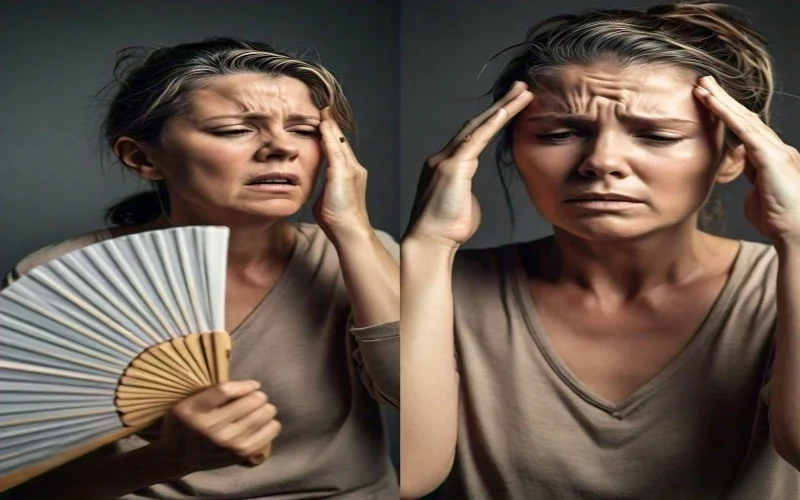Menopause is a normal biological process that ends a monthly period of women and reproductive years. This process of change can lead to a number of physical and emotional changes. That’s why it is really very important to understand what menopause actually is, what are its symptoms and how can you treat it in an effective way. This comprehensive information enables you to find out ways and means for managing this important stage of life. This complete article is all about. After reading this article you will be in a position to better understand menopause. Let’s get started.
What is Menopause?
It is important to understand that menopause normally happens between the ages of 45 and 55. So we can say that the average age in this context is 51. In most of the cases it is diagnosed when a woman spends 12 months without a menstrual cycle. Menopause actually indicates the end of the ovarian cycle and a decrease in hormone production such as progesterone and estrogen.

Stages of Menopause
There are three stages of menopause. Let’s discuss one by one.
Perimenopause
Perimenopause is the period of transition before menopause. It is very important to note that this period can begin many years before menopause. In most cases this period starts at the age of 40 of a woman but sometimes it can start as early as the age of 30s. In the period of perimenopause ovaries produce estrogen and progesterone in a different way. When this happens it results in irregular menstruation periods and some other symptoms as well.
Menopause
The condition of menopause comes into existence when a woman has not experienced periods for 12 months in a row. In this way the ovaries stop producing eggs and produce most of their estrogen.
Postmenopause
Postmenopause is actually a period that comes after menopause. Due to the lower level of estrogen, those women who are postmenopausal are more likely to suffer various health issues including heart disease and osteoporosis.
Common Symptoms of Menopause
The symptoms of menopause can be different from woman to woman. That’s why it is really very important to understand the symptoms in a comprehensive way for effective diagnosis and better treatment. This part of the article is very important as we are going to talk about in a brief way about the common symptoms of menopause. Let’s have a look.

Hot Flashes
When we talk about hot flashes it means unexpected feelings of heat that can spread the entire body. After hot flashes, a person can experience sweating and a red heated face. This condition can last for a few seconds to several minutes. There is also a possibility of this happening several times in a day or even months.
Night Sweats
Night sweats are another symptom that someone can experience in case of menopause. They are basically intense hot flashes that happen mostly during sleep. In this way the quality of sleeping of a woman is disturbed to a greater extent.
Irregular Periods
Another common but important symptom of menopause is the start of irregular periods. Research has shown that mostly during perimenopause menstrual periods become inconsistent. They can be shorter, longer, heavier or lighter. It is also important to note that the duration of these periods can also vary.

Vaginal Dryness and Discomfort
Vaginal dryness and discomfort is also another important symptom in case of menopause. This condition actually happens due to the lower amount of estrogen levels that makes vaginal tissues dry up. In this way vaginal tissues start to become thinner and lose their elasticity. When this situation arises it can be the result of pain, itching and discomfort during sexual activity or intercourse.
Mood Changes
Due to the change of hormones during menopause it can lead to changes in mood and also results in irritation, and a higher risk of sadness and anxiety.
Sleep Problems
Most of the women during menopause experience issues in their sleeping. In medical terms menopause can create insomnia or difficulty sleeping and keeping sleep. Research has shown that in most of the cases, night sweats and hot flashes can create sleeping issues.
Weight Gain and Slower Metabolism
It is observed that most of the women increase their weight during menopause and also the process of metabolism also slows down. This condition actually happens due to the changes in hormones, that’s why the chances of belly fat increases.

Thin Hair and Dry Skin
One of the common symptoms in case of menopause is thin hair and dry skin. This actually happens due to the lower level of estrogen. You can also experience broken nails as well.
Health Risks Associated with Menopause
The major point here to discuss is the decrease in estrogen level in case of menopause. Medical research has shown that there are some health conditions that can arise during menopause. So it is very important to understand these risk factors also. Let’s have a look.
Osteoporosis
Estrogen Level is very important in order to maintain the density of the bone. After Menopause most of the women experience osteoporosis due to the lower level of production of the estrogen. Remember osteoporosis is a medical condition where bones start to weaken and fracture.
Cardiovascular Disease
Less production of estrogen during menopause can create cardiovascular diseases as well such as heart attack and stroke. So it is important to be aware about this entire situation and prepare to prevent these types of risk factors.

Urinary Incontinence
It is the possibility that during menopause the tissues of the urinary tract become weak. When this happens, the ability to urinate decreases to a greater extent. Besides that, the chances of urinary tract infection also increase.
Treatments and Management of Menopause Symptoms
It is a fact that menopause is a natural process but with the help of changes in your lifestyle and implementing some treatment methods you can manage its symptoms more effectively. Let’s have a look.
Hormone Replacement Therapy
Hormone replacement therapy is one of the best options in order to treat menopause. In this type of method estrogen and progesterone is used in order to reduce symptoms of menopause. Research has shown that it is mostly effective in some cases like decreasing hot flashes, night sweats and the dryness of the vagina. It is very important to understand that hormone replacement therapy is not equally effective for every woman. Before going to this treatment method it is important to consult your doctor.
Non Hormonal Medications
Those women who are not willing to go for hormone placement therapy, non hormonal medicines are the best option for them. There are certain medicines that can help during menopause such as antidepressants including SSRIs and SNRIs. These medicines help to reduce symptoms of hot flashes and mood changes. You can also use gabapentin and clonidine in order to treat hot flashes.
Lifestyle Changes
With the help of lifestyle changes you can also get a lot of results in case of menopause. Let’s talk about some of the important lifestyle changes that you can make very easily.

Diet and Nutrition
It is very important to keep your diet in a balanced way. Try to consume those foods which are rich in calcium, vitamin D and other necessary nutrients. It is because a healthy diet full of nutrition is very important for your overall health and also in case of menopause. There are a lot of options available like leaf green, fortified cereals and dairy products in order to maintain your density of the bone.
Exercise
Exercise is a physical activity that is really very important in order to perform your daily functions in a better way. Regular exercise is the key to success. If you want to keep your healthy weight, improve your mood and protect your bones and heart then make a habit of taking regular exercise like jogging, walking or weight training.
Stress Management
We have deeply discussed stress in our previous article about how it is fatal for your overall quality of life. Try to reduce stress in your life as much as you can. For this purpose there are a lot of techniques and practices that you can apply like deep breathing exercises, meditation or yoga.
Natural and Alternative Therapies
It is also observed that some of the women get relief from menopausal symptoms by implementing natural and alternative remedies. In this part of the article we are going to talk about some important natural and alternative therapies. Let’s have a look.
Herbal Supplements
Herbal supplements are considered as best treatment options in order to reduce symptoms of menopause. Medical research has shown that the use of herbal supplements like red clover, black cohosh, and soy products are really helpful in symptoms like hot flashes. They can give different benefits to different menopausal women. So it is important to use them with care and better to consult your professional nutritionist or a healthcare provider.
Acupuncture
Acupuncture is a traditional Chinese medical procedure where tiny needles are put into specific areas of the body. It is observed that some of the women actually feel relaxed from symptoms like hot flashes and also improve the quality of sleep as well.
Mind Body Practice
Mind body practice is another best natural alternative in case of menopause. There are certain practices or methods like mindfulness meditation, qi gong and Tai Chi that are considered as helpful in order to reduce stress and enhance general health.
Emotional and Psychological Support
Those women who are suffering from menopause can understand how challenging they can be. But with the help of emotional and psychological support you can manage symptoms of menopause to a greater extent. Here in this part of the article we will talk about some of the important techniques that you can do very easily. Let’s have a look.

Counseling and Therapy
As we have said earlier, menopause can be emotionally and psychologically challenging so it needs proper counseling. It is better to consult with your counselor or therapist and discuss all your symptoms and conditions in front of them. By doing this you can really improve the symptoms like anxiety, mood swing and sadness. In this whole picture cognitive behavioral therapy is considered helpful for treating symptoms of menopause.
Support Groups
In this very difficult and challenging time of menopause there is need for support. You can join support groups related to menopause. By doing this you can get appropriate advice from those women who are also suffering from the same condition as you are. Just start sharing your experiences with other women in those particular groups.
Open Communication
Well if you are suffering from menopause then it is really important to discuss your issue with your friends and family and your beloved ones. In this way you can get some important advice from them. Open communication can be helpful in your cause.
Long Term Health and Fitness
It is very important to maintain your good health and fitness during menopause. For this purpose you have to take some critical steps. Let’s talk about one by one.
Regular Health Screenings
Make sure that you go for regular health checkups with your doctor. It is because by doing this it helps to monitor possible risk factors which are related to menopause. It is important to keep a close eye on bone density and blood pressure.
Healthy Lifestyle Choices
Try to maintain a healthy lifestyle where everything is up to the mark. Moderation is the key to success in this whole picture. It is important to make it a habit to take regular exercise, eat a balanced diet, stop smoking, and reduce the consumption of alcohol if you have already taken enough. By doing this you will not only improve your general health but also reduce the chances of risk factors associated with menopause.
Staying Informed
It is really crucial to understand what menopause actually is and how you can handle it. Try to stay informed and keep in touch with your healthcare providers, visit reliable websites and medical organizations in order to collect necessary information related to menopause and its management.
Conclusion
Menopause is basically a normal stage of life that comes with its particular challenges and difficulties. You can manage it in a comprehensive way when you understand its symptoms and look into the best treatment options. In the very challenging time of menopause it is important to get emotional and psychological support from your friends and family and other reliable sources. It is very important to understand that every woman has different symptoms of menopause. So the treatment process can also be different. You can deal with it with the right knowledge and effective management techniques.
